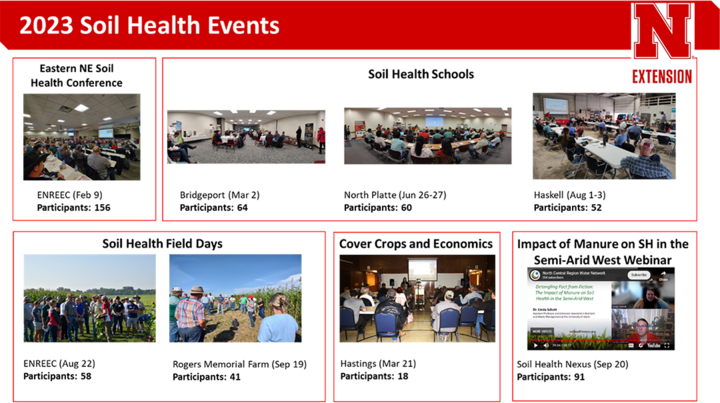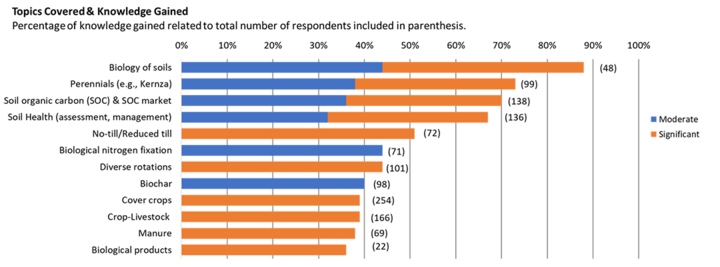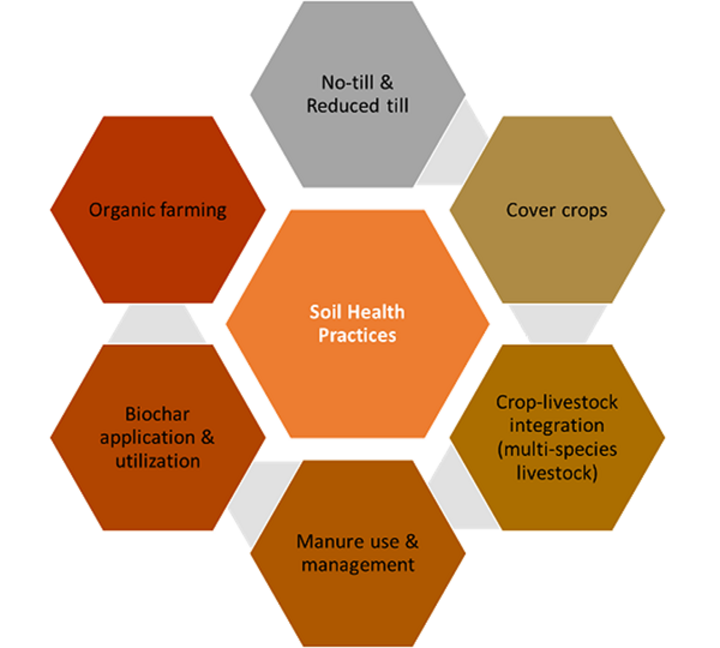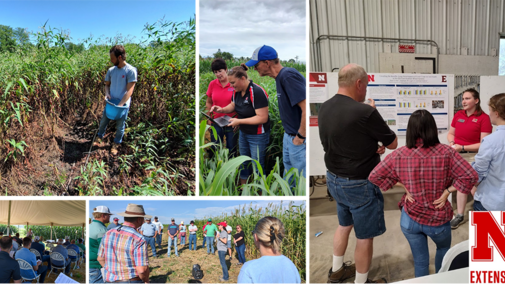Healthy soils sustain not only healthy crops and animals, but also healthy societies. Therefore, healthy and living soil is a breathing ecosystem that sustains the very foundation of agriculture and more so here in Nebraska. In the heartland of agriculture innovation, the UNL Soil Health Team proudly marks its first anniversary of dedicated efforts promoting sustainable farming practices in Nebraska. While 2023 has reached an end, it is appropriate to reflect on its impact and look forward to an even more engaging and informative future.
Successful 2023 Soil Health Events
In 2023, the UNL Soil Health Team organized a conference, three soil health schools, two field days, a workshop on the economics of cover crops, and a webinar sponsored by the Soil Health Nexus on the impact of manure on soil health in the semi-arid west. These events occurred in various locations across Nebraska, including Bridgeport, North Platte, Hastings, Ithaca, Haskell and Lincoln, attracting 540 attendees (92% Nebraska and 8% out of state), fostering engagement and knowledge sharing.

Soil Health Event Highlights
Most UNL soil health events were surveyed, except for the Rogers Memorial Farm Soil Health field day, workshop and webinar. Out of 390 surveyed attendees, 60% responded, and 52% of them were recurring participants in our soil health events (Figure 1). Our programs covered 12 different soil health-related topics and practices presented in diverse formats: keynote presentations, research-based talks, on-farm research farmers panels, students' posters, field demo plots, and soil health assessment training (Figure 2).
The overall satisfaction across all UNL Soil Health events was reported as one of the best (15% of respondents), and above adequate (68% of respondents) in terms of content, organization and overall satisfaction. Significant impact on knowledge shared on soil health practices or technologies, with “moderate” and “significant knowledge” gained by participants (Figure 2). Moreover, a total of 43% of producers mentioned they have implemented soil health practices influenced by the UNL Soil Health events (Figure 3). The total value of knowledge gained by participants was $101.6 million, with a total field area of 12.7 million acres directly or indirectly managed by producers and crop advisers attending our soil health events.
Overall, attendees praised our 2023 UNL Soil Health Program as excellent, informative and enjoyable. The diversity of topics, knowledge of presenters, and inclusion of local producers' panels were particularly appreciated. Positive remarks were shared about specific speakers, presentations and the practical insights provided by the rain simulator and soil health rapid assessment.



Future Plans
The UNL Soil Health Team is committed to continuous improvement. Future soil health events will integrate live displays, hands-on activities and field demonstrations. Participants' suggestions for diverse soil health practices focused on environmental aspects such as carbon sequestration, nutrient conservation and water quality (Figure 4). The list of soil health management practices and training topics requested were:

For the upcoming years, the UNL Soil Health Team is structuring several hands-on activities where Nebraska producers can learn how to monitor soil health cost-effectively, easily, and self-conducted. Also, provide learning opportunities on how to transition to organic farming. In closing, the UNL Soil Health Team remains dedicated to enhancing the future of sustainable agriculture, and with the valuable feedback received, we look forward to delivering even more impactful and engaging soil health events in the coming years.
Acknowledgements
First and foremost, the UNL Soil Health Team is grateful for the participation, support and enthusiasm of diverse participants, local and from other Midwestern states (Iowa, South Dakota, Kansas, Michigan, Minnesota and Arkansas). Thanks to USDA NRCS, Nebraska Soybean Board, Cargill, and the Soil Health Nexus for sponsoring our 2023 soil health events. Special thanks to UNL Soil Health Team members who kindly helped leading or co-organizing these events: Katja Koehler-Cole, Bijesh Maharjan, Aaron Nygren, Nathan Mueller, Leslie Johnson, Ron Seymour, Paul Jasa and Nicole Heldt. I also want to thank UNL graduate students, faculty, extension educators and on-farm research producers who generously shared their knowledge and experience during these events, actively engaging with our avid soil health stewards.
Visit our website for more information about the UNL Soil Health Program, projects and future events.

